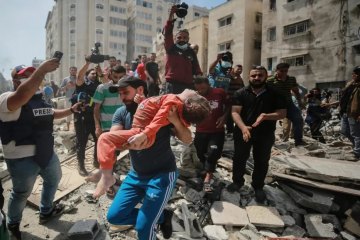
Is the Bombardment of Hospital in Gaza an Example of Crime against Humanity?
Is the Bombardment of Hospital in Gaza an...
Crimes against humanity are widespread or systemic criminal acts which are committed by or on behalf of a de facto authority, usually by or on behalf of a state, that grossly violate human rights. Unlike war crimes, crimes against humanity can be committed during both peace and war Article 7 of the ICC (Rome) Statute defines crimes against humanity "crime against humanity" means any of the following acts when committed as part of a widespread or systematic attack directed against any civilian population, with knowledge of the attack. Therefore the establishment of criminal accountability against committing a crime against humanity requires the proof of (a) Murder; (b) Extermination; (c) Enslavement; (d) Deportation or forcible transfer of population; (e) Imprisonment or other severe deprivation of physical liberty in violation of fundamental rules of international law; (f) Torture; (g) Rape, sexual slavery, enforced prostitution, forced pregnancy, enforced sterilization, or any other form of sexual violence of comparable gravity. These acts must be deemed as a part of an extensive or systematic attack against a civilian population, by one culprit with the knowledge that the existence of that attack and subsequently be a state policy or a state’s connivance.
The missile attack of 17 October 2023 against a hospital in Gaza, took place in the form of “attack against a civilian population” and in “widespread” and “systematic” and “intentional” way. Civilian population means individuals who are not deemed as military or if they are military, they have not taken part in armed conflicts. The Gaza attack target population were civilians and the targeted place was a hospital which is forbidden to be attacked in armed conflicts according to international documents. Article 18 of the Fourth Geneva Convention stresses: “Civilian hospitals organized to give care to the wounded and sick, the infirm and maternity cases, may in no circumstances be the object of attack, but shall at all times be respected and protected by the Parties to the conflict.” "Widespread" means that the attack was carried out extensively and against a notable number of civilians. In the attack on the Gaza hospital, more than 1500 civilians were killed which clearly shows the extent of the attack. Systematic means that the attack is carried out on an “organized plan” to achieve a “specific objective”; which is observed in the attack. In fact, the criteria for an “systematic” attack refers to the nature of systematic violent acts and improbability of an accidental occurrence.
This crime was so blatant that many individual and legal persons deemed it as a crime against humanity. In this regard, the UN Third Committee called the attack, which resulted in the death and forced displacement of Palestinian civilians, as brutal and condemned it. Also, during the general debate of this Committee, a large number of various state representatives also condemned the recent attack against the hospital in Gaza and called for free and unobstructed and safe humanitarian access. In this regard, UN experts also called the attacks against hospitals and schools crimes against humanity and condemned them. In addition, these experts expressed their serious concern over the 16-year-blockade of the people of Gaza by Israel. They reminded that the UN Security Council had on several occasions condemned the use of hunger against civilians as war tactics which according to international humanitarian law and criminal law are prohibited and violate international humanitarian law. The London-based charity Oxfam also declared that the bombing of a hospital is a war crime and called for immediate humanitarian access to Gaza.

The aerial bombing of Gaza is tantamount to crime of genocide
Article 2 of the Convention defines genocide as any of the following acts committed with intent to destroy, in whole or in part, a national, ethnic, racial or religious group, as such: (a) Killing members of the group; (b) Causing serious bodily or mental harm to members of the group; (c) Deliberately inflicting on the group conditions of life calculated to bring about its physical destruction in whole or in part; (d) Imposing measures intended to prevent births within the group; (e) Forcibly transferring children of the group to another group. The destruction in whole or in part means that the destruction must be affecting more than a few people in a dispersed way. In other words, the realization of the crime of genocide does not require the total destruction of a group. Furthermore, the committing of the crime must be with “intent” of committing of such a crime and “banned acts” must also be committed, banned acts that have been stated in various paragraphs of this Article as a crime, be it murder, or infliction of injury to physical and psychological health.
In the attack on the hospital in Gaza, which targeted a substantial part of civilian population with intent to destroy, more than 1500 people were killed. This crime was so extensive that UN experts said that they will ring the alarm bells. Drawing on the remarks made by the Israeli political leaders and their allies, we can conclude that, alongside the military operations in Gaza and escalation of arrests and killings in the West Bank, the threat of genocide against Palestinian people exists.
https:///www.un.org/unispal/ document/gaza-un-experts-decry-bombing-of-hospitals-and-schools-as-crimes-against-humanity-call-for-prevention-of-genocide/
https://www.aa.com.tr/en/europe/bombing-a-hospital-is-a-war-crime-oxfam/3023925
https://www.un.org/unispal/document/gaza-un-experts-decry-bombing-of-hospitals-and-schools-as-crimes-against-humanity-call-for-prevention-of-genocide/
 Reload
Reload



